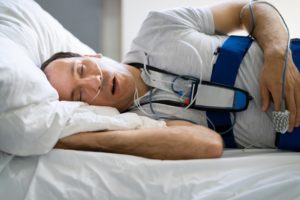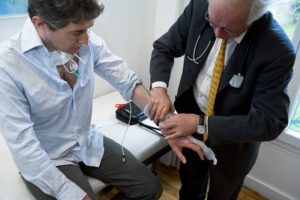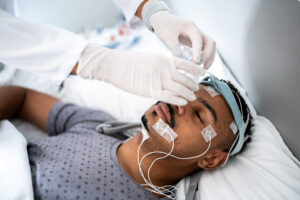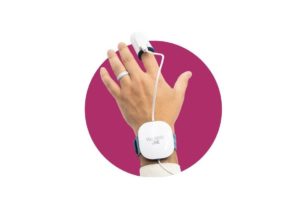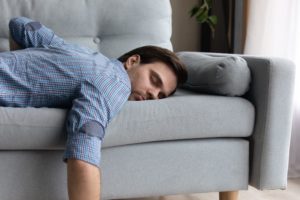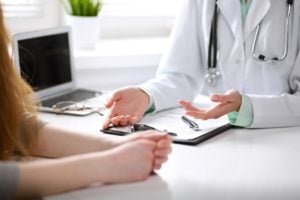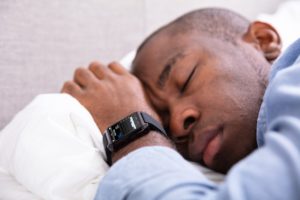How Much Does A Sleep Study Cost?
- Sleep study costs vary depending on the location and type of study.
- Insurance often covers a portion of the cost for medically necessary sleep studies.
- Out-of-pocket expenses for a sleep study can range from a few hundred to a few thousand dollars.
- A home sleep test can help you determine if you meet the criteria for a sleep apnea diagnosis.
The cost of a sleep study can range from less than $500 to more than $10,000, depending on insurance coverage as well as whether it is an in-lab or at-home study. A sleep study helps doctors and sleep specialists diagnose many types of sleep disorders. People may also undergo sleep studies to establish a treatment plan or to confirm that treatment is working well.
Sleep studies use specialized equipment to collect diagnostic measurements related to sleep health, often in a sleep lab. We discuss the factors that influence how much a sleep study costs.
Is Your Troubled Sleep a Health Risk?
A variety of issues can cause problems sleeping. Answer three questions to understand if it’s a concern you should worry about.
Cost of a Sleep Study
A sleep study can cost as little as $150 for an in-home sleep study or more than $10,000 for an in-lab sleep study. Sleep study costs vary from state to state and depend in part on whether a person has insurance coverage .
In-Lab Sleep Study
The average price of an in-lab sleep study is $3,000 . Prices can range from $1,000 to over $10,000, depending on insurance coverage. Facility charges for hospital outpatients can also drive up the total cost of an in-lab sleep study. Fortunately, many insurance providers cover much of a sleep study’s cost.
“The benefits of diagnosing and treating sleep disorders far outweigh the costs.”
Dr. Abhinav Singh, Sleep Physician
An in-lab sleep study, also known as polysomnography, conducts a comprehensive analysis of a person’s sleep quality by measuring their brain waves, breathing, heart rate, and other parameters. Afterward, sleep specialists analyze the results to reach a diagnosis. This type of sleep study costs more than an at-home sleep study because it takes place while the person sleeps overnight in a lab, with technicians on hand.
An in-lab sleep study can take place in a sleep lab attached to a hospital or in an independent qualified sleep clinic.
People who appear to have an uncomplicated case of moderate to severe obstructive sleep apnea (OSA) may be eligible for a split-night sleep study. The first part of the night is used to diagnose the severity of the sleep apnea while the second half is used to fit the person with a positive airway pressure (PAP) device, a common OSA treatment. A split-night sleep study can be more cost-effective , since it saves the person from having to come back another night for PAP titration.
At-Home Sleep Study
At-home sleep studies can range from $150 to around $1,000 or more, which is much less than in-lab sleep studies. This type of sleep study uses less equipment and takes place at a person’s home, unattended by technicians. The price of an at-home sleep study also depends on the equipment required.
The cost of an at-home sleep study is lower than an in-lab sleep study because it does not involve an overnight clinic stay, typically takes fewer measurements, and has no technicians in attendance. However, a sleep clinic still oversees the test and provides the equipment and instructions, while a certified sleep specialist interprets the results .
Since an at-home sleep study takes fewer measurements than an in-lab sleep study, it is not an appropriate test for most sleep disorders. Usually, doctors only recommend at-home sleep studies for people suspected of having moderate to severe obstructive sleep apnea with no other co-occurring sleep disorders. At-home sleep studies may not be appropriate for people with heart or lung conditions.
Most at-home sleep tests do not measure brain waves, so they may not accurately reflect the amount of time a person is asleep. As a result, at-home tests may underestimate the severity of a person’s OSA . Doctors may request a follow-up in-lab sleep study if the results are inconclusive, which can increase the total cost of testing.
Additional Costs
Some sleep clinics and providers may bill significant outpatient costs in addition to the cost of the sleep study itself. These can include fees for interpreting the test, as well as for treatment and follow-up appointments. These fees may or may not be covered by insurance.
For example, doctors prescribe positive airway pressure therapy to many people with obstructive sleep apnea. A second in-lab sleep study may be required to set up and properly calibrate the PAP machine so that it works effectively while the person is sleeping.
Ongoing costs after the sleep study may include renting or buying a PAP machine, buying related sleep accessories such as a humidifier and PAP mask, and follow-up visits to adjust the airway pressure of the PAP machine.
These costs may be covered by insurance, but some insurance providers require stringent adherence to guidelines for proper use.

Are Sleep Studies Covered by Insurance?
Sleep studies are usually covered by insurance if they are deemed medically necessary.
Medicare covers 80% of the cost of medically necessary sleep studies and PAP titration after the deductible is met, including in a hospital or an approved sleep clinic. To qualify for coverage, a person must have a doctor’s referral for testing based on symptoms of a sleep disorder such as sleep apnea, narcolepsy, or a parasomnia.
The conditions for Medicaid coverage are similar: a person must have symptoms of a relevant sleep disorder and undergo the test in an approved facility. Medicaid and Medicare also cover at-home sleep studies for suspected obstructive sleep apnea.
Coverage from private insurance providers may vary. Before booking a sleep study, a person should confirm that the center they have chosen is covered by their insurance plan.
As with most medical treatments, a person may be responsible for paying a deductible if they have not yet reached their limit. If the plan has a very high deductible, or if a person does not have insurance, they may want to ask for quotes from several sleep clinics.
How to Get a Sleep Study
The first step to obtaining a sleep study is to talk to your doctor about your sleep problems. To provide a better picture of your sleep patterns, it may help to keep a sleep diary before your doctor’s appointment. A sleep partner can also help by sharing observations about your behaviors during sleep.
Your doctor may conduct tests or ask you to fill out a questionnaire about your sleep patterns and medical history. If your doctor refers you for a sleep study, you should contact your insurance provider to make sure the sleep center is covered by your plan.
If your doctor refers you for a sleep study, you will make an appointment for the study with the sleep center or pick up the equipment needed for an at-home sleep study. The center will explain how the sleep study works and how to prepare for the sleep study.
Not all sleep disorders are diagnosed with polysomnography. People with certain sleep disorders may require different tests, such as the maintenance of wakefulness test or the multiple sleep latency test, in addition to or instead of a polysomnography sleep study.

Still have questions? Ask our community!
Join our Sleep Care Community — a trusted hub of sleep health professionals, product specialists, and people just like you. Whether you need expert sleep advice for your insomnia or you’re searching for the perfect mattress, we’ve got you covered. Get personalized guidance from the experts who know sleep best.
References
13 Sources
-
FairHealth Consumer. Consumers estimate your healthcare expenses.
https://www.fairhealthconsumer.org/medical/zip -
Chiedi, J. M. (2019, June). Medicare payments to providers for polysomnography services did not always meet Medicare billing requirements. Department of Health and Human Services, Office of Inspector General., Retrieved March 13, 2023, from
https://oig.hhs.gov/oas/reports/region4/41707069.pdf -
Henry, O., Brito, A., Lloyd, M. C., Miller, R., Weaver, E., & Upender, R. (2022). A model for sleep apnea management in underserved patient populations. Journal of Primary Care & Community Health, 13, 21501319211068969., Retrieved March 13, 2023, from
https://pubmed.ncbi.nlm.nih.gov/35040343/ -
NC Medicaid: Sleep studies and polysomnography services. (2021, May 1). Medicaid and Health Choice Clinical Coverage Policy No.: 1A-20., Retrieved March 13, 2023, from
https://medicaid.ncdhhs.gov/media/12476/download?attachment -
Kramer, N. R. & Millman, R. P. (2022, November 15). Overview of polysomnography in adults. In S. M. Harding (Ed.). UpToDate., Retrieved March 13, 2023, from
https://www.uptodate.com/contents/overview-of-polysomnography-in-adults -
Kim, R. D., Kapur, V. K., Redline-Bruch, J., Rueschman, M., Auckley, D. H., Benca, R. M., Foldvary-Schafer, N. R., Iber, C., Zee, P. C., Rosen, C. L., Redline, S., & Ramsey, S. D. (2015). An economic evaluation of home versus laboratory-based diagnosis of obstructive sleep apnea. Sleep, 38(7), 1027–1037.
https://pubmed.ncbi.nlm.nih.gov/26118558/ -
Pietzsch, J. B., Garner, A., Cipriano, L. E., & Linehan, J. H. (2011). An integrated health-economic analysis of diagnostic and therapeutic strategies in the treatment of moderate-to-severe obstructive sleep apnea. Sleep, 34(6), 695–709.
https://pubmed.ncbi.nlm.nih.gov/21629357/ -
Wickramasinghe, H. (2020, September 15). Obstructive sleep apnea (OSA) workup., Retrieved March 13, 2023, from
https://emedicine.medscape.com/article/295807-workup#showall -
Strohl, K. P. (2022, October). Obstructive sleep apnea (OSA). Merck Manual Professional Version., Retrieved March 13, 2023, from
https://www.merckmanuals.com/professional/pulmonary-disorders/sleep-apnea/obstructive-sleep-apnea-osa -
U.S. Centers for Medicare and Medicaid Services. (n.d.) Durable medical equipment (DME) coverage. Medicare.gov., Retrieved March 13, 2023, from
https://www.medicare.gov/coverage/durable-medical-equipment-dme-coverage -
U.S. Centers for Medicare and Medicaid Services. (n.d.) Continuous positive airway pressure (CPAP) devices, accessories, & therapy. Medicare.gov., Retrieved March 13, 2023, from
https://www.medicare.gov/coverage/continuous-positive-airway-pressure-devices -
U.S. Centers for Medicare and Medicaid Services. (n.d.) Sleep studies. Medicare.gov., Retrieved March 13, 2023, from
https://www.medicare.gov/coverage/sleep-studies -
U.S. Centers for Medicare & Medicaid Services. (2009, August 10). Sleep testing for obstructive sleep apnea (OSA). CMS.gov., Retrieved March 13, 2023, from
https://www.cms.gov/medicare-coverage-database/view/ncd.aspx?NCDId=330&ncdver=1&bc=AAAAQAAAAAAAAA%3d%3d&



